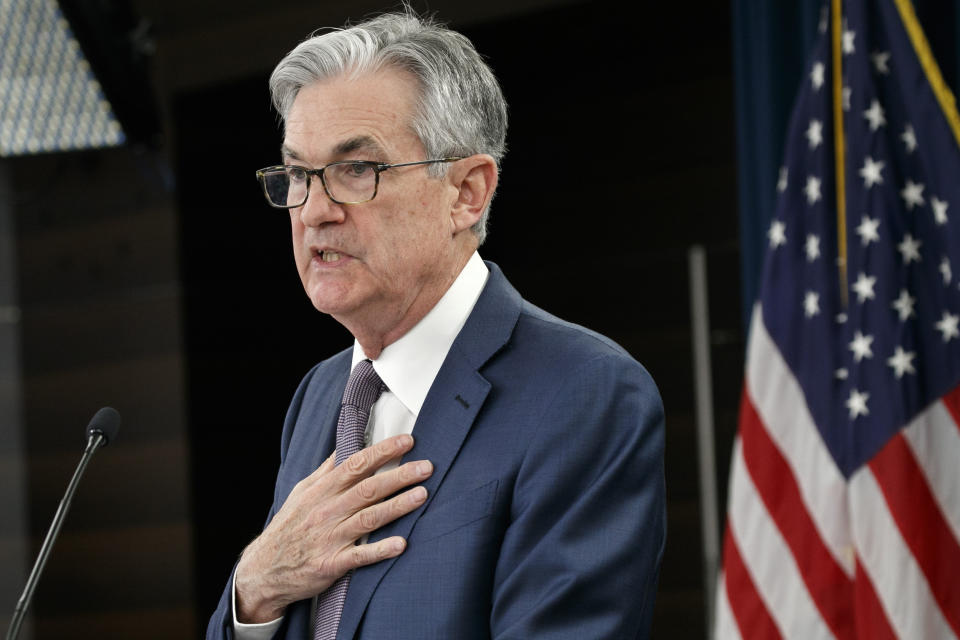Fed makes 'aggressive' move to back corporate debt markets, Main St.
The Federal Reserve called a third emergency meeting to combat the economic impact of the novel coronavirus and unveiled a number of new and “extensive” measures on Monday that would expand the Fed’s efforts to calm corporate debt markets. The Fed also said a direct lending program to Main Street businesses will be announced soon.
With turmoil continuing in corporate financing markets, the Fed expanded the scope of its asset purchases under its quantitative easing program and announced four new measures to grease the commercial paper, corporate bond, and even ETF markets.
The Fed also committed to the “establishment of a Main Street Business Lending Program to support lending to eligible small-and-medium sized businesses,” similar to programs from the Small Business Administration.
The Fed estimates the impact of its measures to provide about $300 billion in new financing available to businesses.
“While great uncertainty remains, it has become clear that our economy will face severe disruptions,” The Fed said in a statement Monday morning. “Aggressive efforts must be taken across the public and private sectors to limit the losses to jobs and incomes and to promote a swift recovery once the disruptions abate.”
New tools
The Fed announced that it was suspending its previous guidance on quantitative easing, which sought to buy “at least” $500 billion in U.S. Treasuries and $200 billion in agency-backed mortgage-backed securities “over coming months.” The Fed now says it will purchase securities “in the amounts needed,” and will also expand the scope of those purchases to include agency commercial mortgage-backed securities.
The central bank also unveiled a Primary Market Corporate Credit Facility (PMCCF) that would directly purchase eligible corporate bonds from investment grade issuers in addition to a Secondary Market Corporate Credit Facility (SMCCF) that would buy corporate bonds in the secondary market, which could include some eligible investment grade corporate bond exchange-traded funds.
Both programs will last until September 30, 2020.

To further ease corporate credit conditions, the Fed also reduced the pricing of its previously-announced efforts to buy commercial paper and expanded the program to include high-quality, tax-exempt commercial paper.
In the wake of the coronavirus, the Fed had already slashed interest rates to zero, announced over $1 trillion of liquidity support to money markets, and coordinated with central banks around the world to address a U.S. dollar shortage. But because of the harsh and accelerated impact of the virus to businesses of all sizes, many have called on the Fed to re-think the use of its toolkit, which has historically targeted the banking and finance industries.
For example, lawmakers have floated direct lending program to Main Street businesses and Boston Fed President Eric Rosengren has called on Congress to grant the central bank the authority to directly buy corporate bonds.
Because the Fed does not have the authority to take on corporate bonds onto its balance sheet, it worked with the U.S. Treasury to open special purpose vehicles (SPVs) that then purchase assets through the PMCCF, SMCCF, and previously announced Commercial Paper Funding Facility (CPFF) programs.
Under the Fed’s authority granted by Section 13(3) of the Federal Reserve Act, the central bank then lends to the SPV to support the vehicle’s purchases. The programs were approved by the U.S. Treasury in amounts of $10 billion each.
Although the measures are from a new playbook, the Fed also opened up the crisis-era Term Asset-Backed Securities Loan Facility (TALF) to offer loans secured by eligible asset-backed securities.
The TALF is also structured as a special purpose vehicle.
The Fed’s decision was unanimous among the voting members of the Federal Open Market Committee. The next scheduled FOMC meeting is April 29.
-
Brian Cheung is a reporter covering the Fed, economics, and banking for Yahoo Finance. You can follow him on Twitter @bcheungz.
Energy-exposed banks attempt to bounce back after second punch from oil prices
Fed's move to tap liquidity operations will 'buy time' on more rate cuts: Barclays
'Talk ourselves into a recession': Bank in coronavirus hotspot has doubts over Fed rate cut
Boston Fed President: Quantitative easing may not work as well next time
'We are all competing': Los Angeles finds new ways to tackle labor shortage
Read the latest financial and business news from Yahoo Finance
Follow Yahoo Finance on Twitter, Facebook, Instagram, Flipboard, SmartNews, LinkedIn, YouTube, and reddit.
